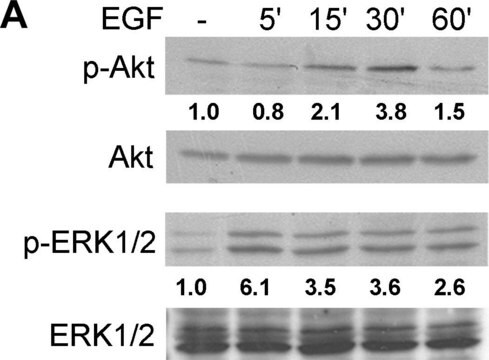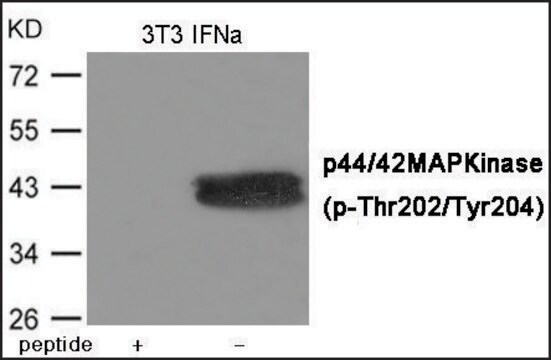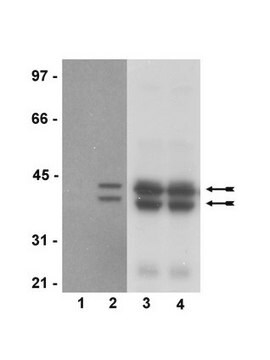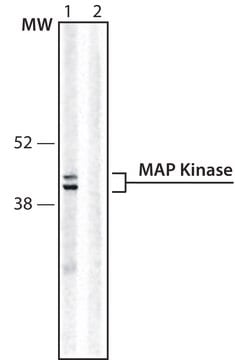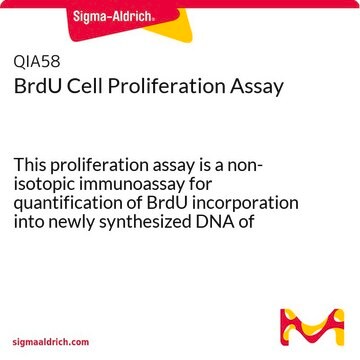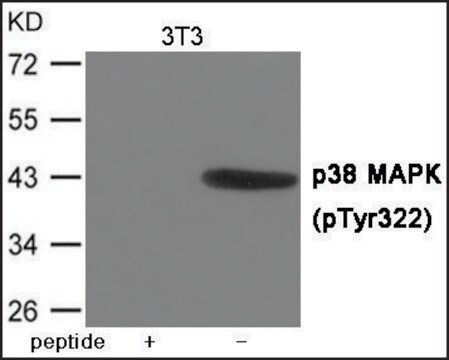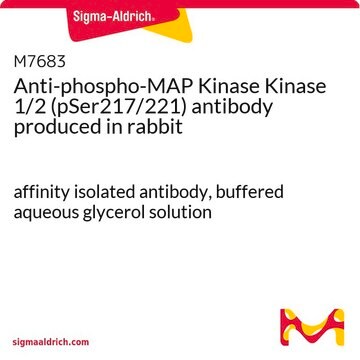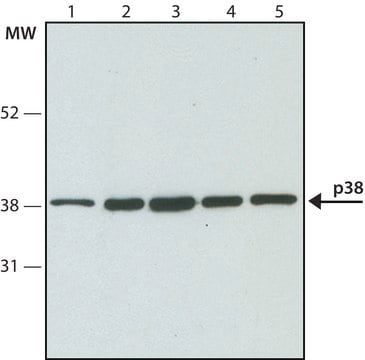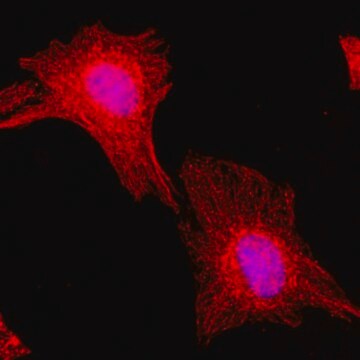M9692
Anti-MAP Kinase, Activated (Diphosphorylated ERK-1&2) antibody, Mouse monoclonal
clone MAPK-YT, purified from hybridoma cell culture
Synonym(s):
Monoclonal Anti-MAP Kinase, Activated (Diphosphorylated ERK-1&2)
About This Item
Recommended Products
biological source
mouse
Quality Level
conjugate
unconjugated
antibody form
purified immunoglobulin
antibody product type
primary antibodies
clone
MAPK-YT, monoclonal
form
buffered aqueous solution
mol wt
antigen ERK-1 44 kDa
antigen ERK-2 42 kDa
species reactivity
human, Caenorhabditis elegans, Xenopus, Drosophila, hamster, rat, bovine, mouse, yeast
packaging
antibody small pack of 25 μL
concentration
1.5-2 mg/mL
technique(s)
immunocytochemistry: suitable
immunohistochemistry (formalin-fixed, paraffin-embedded sections): suitable
immunoprecipitation (IP): suitable
indirect ELISA: suitable
microarray: suitable
western blot: 0.5-1 μg/mL using a whole cell extract of RAT-1 cells treated with vanadate and H2O2.
isotype
IgG1
UniProt accession no.
shipped in
dry ice
storage temp.
−20°C
target post-translational modification
unmodified
Gene Information
human ... MAPK1(5594) , MAPK3(5595)
mouse ... Mapk1(26413) , Mapk3(26417)
rat ... Mapk1(116590) , Mapk3(50689)
Looking for similar products? Visit Product Comparison Guide
General description
Anti-MAP Kinase, Activated (Diphosphorylated ERK-1&2) antibody, Mouse monoclonal (mouse IgG1 isotype) is derived from the MAPK-YT hybridoma produced by the fusion of mouse myeloma cells (NS1) and splenocytes from BALB/c mice immunized with a synthetic phosphorylated peptide containing amino acids corresponding to the phosphorylated form of ERK-activation loop, conjugated to KLH. The isotype is determined by a double diffusion immunoassay using Mouse Monoclonal Antibody Isotyping Reagents, Product Number ISO2.
Specificity
Immunogen
Application
Monoclonal Anti-MAP Kinase, activated (Diphosphorylated ERK-1&2) antibody produced in mouse has been used in detection of
- ERK1/2 in cardiac myocytes using immunofluorescence microscopy
- ERK1/2 in human eosinophils using western blotting
- ERK in human bronchial epithelial cells using protein array
- ERK proteins in human liver cell lines using immunofluorescence assay and western blot analysis
- ERK1/2 in human embryonic kidney cells by immunoprecipitation
Biochem/physiol Actions
Monoclonal Anti-MAP Kinase, Activated (Diphosphorylated ERK-1 and 2) is specific for the active, dually-phosphorylated form of MAP kinase (ERK-1 and ERK-2, 44 kDa and 42 kDa, respectively). The epitope recognized by the antibody contains the phosphorylated threonine and tyrosine residues within the regulatory site of active MAP kinase (Thr183 and Tyr185 in ERK-2). It does not recognize the non-phosphorylated or the monophosphorylated forms of the MAP kinase molecule or the diphosphorylated form of Jun-kinase (JNK) and p38 MAP kinase.
Signaling pathways mediated by MAPK are associated in the pathogenesis of neurodegenerative disorders and cancer. Deletion in the ERK1 gene locus is associated with DiGeorge syndrome (DGS) and velocardiofacial syndrome (VCFS) and congenital heart defects. Rearrangements in MAPK3 gene locus may contribute in the pathogenesis of autism spectrum disorders and schizophrenia.
Physical form
Storage and Stability
Disclaimer
Not finding the right product?
Try our Product Selector Tool.
Storage Class Code
12 - Non Combustible Liquids
WGK
nwg
Flash Point(F)
Not applicable
Flash Point(C)
Not applicable
Personal Protective Equipment
Regulatory Listings
Regulatory Listings are mainly provided for chemical products. Only limited information can be provided here for non-chemical products. No entry means none of the components are listed. It is the user’s obligation to ensure the safe and legal use of the product.
JAN Code
M9692-100UL:
M9692-BULK:
M9692-25UL:
M9692-200UL:
M9692-VAR:
Choose from one of the most recent versions:
Certificates of Analysis (COA)
Don't see the Right Version?
If you require a particular version, you can look up a specific certificate by the Lot or Batch number.
Already Own This Product?
Find documentation for the products that you have recently purchased in the Document Library.
Customers Also Viewed
Our team of scientists has experience in all areas of research including Life Science, Material Science, Chemical Synthesis, Chromatography, Analytical and many others.
Contact Technical Service
